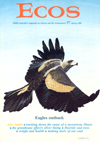In this issue
|
|
||||
| ||||
| ||||
| ||||
| ||||
| ||||
| ||||
| ||||
| ||||
|
|
||||
| ||||
| ||||
| ||||
| ||||
| ||||
| ||||
| ||||
| ||||
Welcome to the ECOS Archive site which brings together 40 years of sustainability articles from 1974-2014.
For more recent ECOS articles visit the blog. You can also sign up to the email alert or RSS feed


